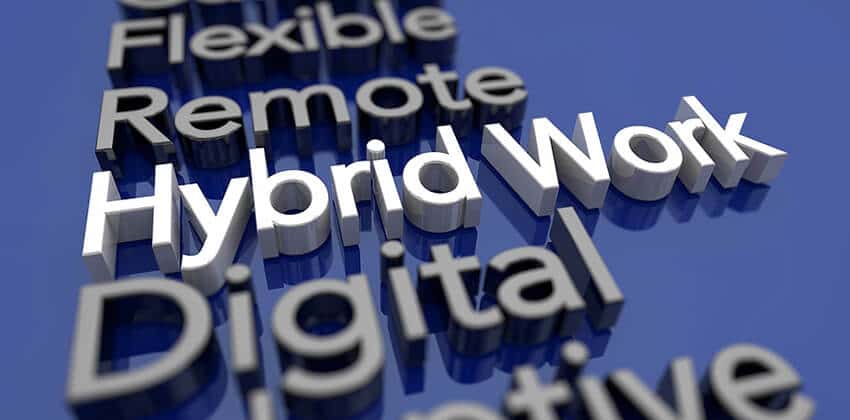
Curious about what constitutes a hybrid work schedule? Perhaps you’ve seen some companies with hybrid job openings. Or, perhaps fully remote just doesn’t seem like it’s your cup of tea.
Turns out you’re in good company. According to Global Workplace Analytics, 82% of U.S. employees want to work remotely at least once a week.
Enter the world of hybrid work—also known as the best of both worlds.
What Exactly Is a Hybrid Work Schedule?
Realistically, there isn’t an exact definition of a hybrid work model. As this article on Hive states, everyone’s hybrid setup is different. For some, that means an employee works remotely a few days a week and in the office the other days.
Other employers may allow some employees to work remotely while other team members work in the office full-time. Often, you’ll find there is a combination of those two hybrid models. A lot is dependent on location and job duties.
Why Job Seekers Are Pursuing Hybrid Work Models
There are a variety of personal benefits an employee may be pursuing with a partially remote role. Hybrid scheduling can solve a lot of dilemmas if you are balancing other obligations.
Being a caregiver to small children or an elderly parent can be a challenge with an inflexible, 9-to-5 schedule.
For others, it’s about lowering anxiety by not joining in the ironically labeled rush hour every day. Cutting down on time spent commuting can offer a much-needed calm to your week.
Speaking of commuting, working at home part of the time also lightens the environmental impact. Unsurprisingly, the EPA lists transportation as the leading source of greenhouse gas emissions.
Perhaps you’ve finally realized the dream of moving out to a rural location. The commute into the city isn’t impossible, but it sure would be nice if it weren’t every day.
Whether your reason is personal, environmental, or both, there are important considerations to ponder before jumping into the first hybrid role you see.
Questions to Ask Yourself When Considering a Hybrid Role
Analyze how you’ll work from home effectively. While the image of sitting on your couch in your jammies all day might be appealing, the reality might lead to back pain and a lack of motivation.
Make a list of your ideal schedule and work location. List out any personal obligations or desires. Are you in charge of school drop-off, or do you love your Monday morning spin class? Write those down.
Where are you going to be conducting your work? You aren’t necessarily tied to your home office. Maybe your goal is to avoid the three o’clock traffic jam, but your house seems too isolating.
The coffee shop down the street or some other coworking spaces might be a great solution. You’ll still find a reprieve from the daily hustle and bustle and be able to get out a bit.
Questions to Ask Employers When Considering a Hybrid Role
Once you’ve got your list of what an ideal hybrid role means for you, here are some questions to help you find it.
Approach the interview with some straightforward questions for the interviewer. This shows you’ve considered the big picture around making a move to a hybrid role.
Your first question should seek clarity around how the employer defines their remote work schedule.
Are all employees working from home part of the week, or is part of the workforce working in the office full-time? Do employees choose which days they’re commuting into the office? How are hours determined on days at home?
Remote Office Space Expectations
Are the benefits provided to in-office employees given to hybrid workers as well? While you might be thinking that donuts in the conference room can be easily given up, a computer and a desk are essential.
Traditionally provided at the office, is the employer also providing technology at home? Who pays for the internet service? Will Zoom meetings require you to get a larger bandwidth? What about software that may be needed to keep you secure?
Beyond software, companies in finance or customer service may require the remote worker to have a quiet work environment separate from the rest of the household. Is that a reality for you currently?
Regarding Team Communication
Casual conversation in the office builds rapport and team dynamics. How intentional is the employer in creating the opportunity for casual conversation for remote team members?
What is the communication schedule, and how are team projects handled? Does the company routinely use online tools and project management software that you’re not familiar with?
Setting Yourself Up for Success
For many, the ability to split their time between a fully remote and an in-person role is the ideal setup. Understanding your needs and the requirements of prospective roles will help you find success in your remote job search.
Don't forget to share this article with friends!




